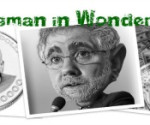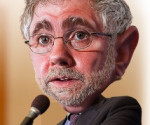Is government spending really ‘investment’?
In a recent blog post, Paul Krugman claims that the lack of spending by state and local government is undermining our “weak recovery.” Of course, he understands that the decline in state and local government spending is coming about because the economies of those states are not generating the same amount of tax revenue as they did before the depression hit.
Now, while Krugman has not called for states and local governments to raise taxes per se, he sees the Sugar Daddy role being filled by the federal government, which should incur even more debt and borrow into near-oblivion, apparently. He writes:
That is, we’re sacrificing the future as well as the present. Oh, and the cuts that aren’t falling on investment in physical capital are largely falling on human capital, that is, education.
It’s hard to overstate just how wrong all this is. We have a situation in which resources are sitting idle looking for uses — massive unemployment of workers, especially construction workers, capital so bereft of good investment opportunities that it’s available to the federal government at negative real interest rates. Never mind multipliers and all that (although they exist too); this is a time when government investment should be pushed very hard. Instead, it’s being slashed.
What an utter disaster.
The comments raise two questions in my mind. The first is the issue of idle resources versus malinvestments. To the Keynesian, all it takes to employ all “idle” or unemployed resources is more spending and, if needed, outright bailouts. (Bailouts always are good if they divert resources to politically-powerful labor unions.)
To Krugman and other Keynesians, the cause of the downturn is simple: spending slowed down and government must take up the slack or we will go down the economic drain. Austrians see things differently, believing that government policies, both monetary and fiscal, directed resources toward unsustainable ends, namely housing. Furthermore, Austrians believe that by continuing to direct massive amounts of spending toward unsustainable projects like “green energy,” the government and the Obama administration simply and surely are blocking the recovery.
The second issue is that of what Krugman calls “investments.” All of this reminds me of Bill Clinton’s throwaway campaign line, “We’re going to invest in education and the environment,” thus creating a new term for what government always has done: spend. All of the rhetoric and all of the spending in the world will not make government schools more effective, as study after study has demonstrated that per pupil spending does not equate to good education results, as there are so many other factors that contribute to educational success.
As for government “investment” in “green energy” products, we are seeing Obama-funded firms go belly-up as though they were on a failure assembly line. Furthermore, even with all sorts of “green” mandates, this business still sucks in resources and spits out unemployment.
Take the Obama administration’s continued obsession with high-speed rail, an obsession that Gov. Jerry Brown in California seems to share. It doesn’t matter to Krugman or Brown or anyone else that thenumbers that the government uses for high-speed rail are utter fiction, nor does it matter that financially high-speed rail would be a black hole.
No, the California high-speed rail project that Obama and Brown want is yet another example of “investment” by government that really is nothing more than a vast welfare scheme for the politically-connected — with everyone else being saddled with the bill. Furthermore, Krugman assumes that political issues don’t factor into “government investment,” as though politicians cared only about financial success. As I see it, the vast amount of “government investment” is pure spending. (Yes, yes, we have roads, but roads are a tiny, tiny portion of overall government spending. And Keynesians assume that if government funds something, then it never ever could exist outside of government funding.)
In the end, Krugman is left to claim that that when state and local spending fall, that means that resources actually are disappearing, as the only way to make things appear is via government spending. In reality, the government spending, the bailouts, and the vast increase in the burden of government has assured us that this depression will last a long, long time, and Krugman will continue to call for even more destruction all the while claiming he just wants us to have a recovery.
Check out the “Krugman in Wonderland” posts here on The Global Dispatch – click here
William L. Anderson is an author and an associate professor of economics at Frostburg State University in Maryland. He is also an adjunct scholar with the Mackinac Center for Public Policy as well as for the Ludwig von Mises Institute in Alabama.
Read more at “Krugman-in-Wonderland”














